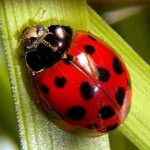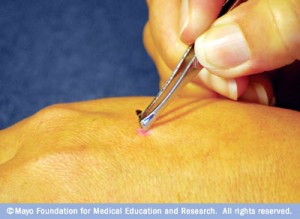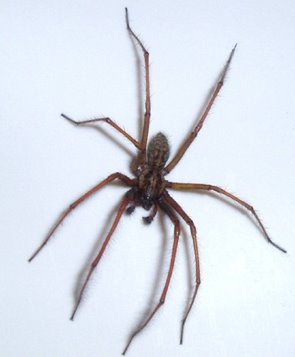READY TO GET STARTED?
REQUEST A FREE ESTIMATE
Fill out the form below or call (888) 466-7849 for a free, no-obligation estimate.
 Ladybugs Seek Warmth in Homes
Ladybugs Seek Warmth in HomesLadybugs are beneficial insects but when they overwinter in your home they become a nuisance pest. They spend the warmer months of spring and summer growing their populations and like other overwintering pests, they seek warmth from the cold temperatures in fall and winter. Many seek shelter under rocks, leaves, or other items found in nature, then you have those that find shelter in homes and buildings.
Although typically harmless, ladybugs can aggravate asthma and cause allergic reactions in people. They can also emit a foul smelling, yellowish fluid that can stain surfaces.
Keeping ladybugs out of your home starts with the usual preventative pest management steps that we typically cover in our blogs: screen all windows, keep doors closed, door sweeps on exterior doors, and seal all cracks and crevices around the exterior of the home (windows, doors, pipes, etc).
If ladybugs have already found their way into your home, use a vacuum cleaner to clean them up. Empty the vacuum bag into a trash bag and make sure it is tightly closed. Discard of the trash bag in a sealed outside container. If you have a ladybug infestation, call a professional pest control company to evaluate, assess, and treat the problem. Call Northwest Exterminating for more on ladybug pest control.
Yellow jackets have barbed like pointers on their stinger that cause the stinger to get lodged into the skin. The stinger is usually left behind, along with the venom sac. It is important to remove a stinger as quickly as possible because venom can continue to be released even if it’s not attached to the bee. The venom can cause an allergic reaction or a possible infection.

Source: Mayo Clinic
Symptoms of infection include:
Consult your Doctor immediately if any of these symptoms occur.
Symptoms of an allergic reaction include:
Consult your Doctor immediately at signs of an allergic reaction.
What to do if stung:
It’s very important to call a pest professional if you believe a yellow jacket nest is near your property. We DO NOT recommend you try to remove this on your own…this could result in being stung.
For yellow jacket removal, wasp removal, and hornet removal, call the professionals at Northwest Exterminating.
Other blogs: How to Treat a Yellow Jacket Sting
 Spiders often get a bad reputation. They are creepy, crawly creatures and we fear their bite. They are often blamed for skin irritations but the fact is that 80% of presumed spider bites are actually due to some other insect bite or skin infection. Most spider bites are harmless and done by accident. However, there are spiders that can cause real harm (black widow, brown recluse). Not only can the bite be painful but the spider’s venom can cause pain as well. Non-venomous spider bite pain will typically last 5 minutes to an hour but a venomous spider bite can be painful for longer than 24 hours.
Spiders often get a bad reputation. They are creepy, crawly creatures and we fear their bite. They are often blamed for skin irritations but the fact is that 80% of presumed spider bites are actually due to some other insect bite or skin infection. Most spider bites are harmless and done by accident. However, there are spiders that can cause real harm (black widow, brown recluse). Not only can the bite be painful but the spider’s venom can cause pain as well. Non-venomous spider bite pain will typically last 5 minutes to an hour but a venomous spider bite can be painful for longer than 24 hours.
Seek medical attention if:
In rare situations, spider bites can cause allergic reaction. In this case, you should seek immediate medical attention.
If you are concerned about spiders in or around your home, call a professional exterminator to identify the problem and develop a customized plan to rid your home of spiders.
We know that bugs are gross and unsanitary but did you also know that they can be bad for our health. WebMD discusses some of the worst bugs and the potential harm they can do to our health:
Tips to prevent feeling the sting of these health issues:
For more information on these insects and their health hazards, visit WebMD: Bad Bugs Slideshow: Identifying Bugs and Their Bites.
If you think you may have been bitten or stung by any of the insects above, please take note of your body’s reaction and seek medical assistance immediately.
Disclaimer: These tips are general medical information and do not constitute medical advice. Please contact your physician for information about yourself or your family member.
Spring has arrived and brought pollen with it. Yesterday’s pollen count is the highest ever recorded in Atlanta for that date. According to Atlanta Allergy and Asthma Clinic, the record number was 9369 per cubic meter.
If you have springtime allergies you are probably having a tough time right now due to the extremely high pollen counts. Even people who do not normally have allergies can be having some difficulties with the pollen.
Symptoms include:
Tips To Avoid Pollen:
Treatment for Hay Fever Symptoms:
If you have a cough, wheezing or difficulty breathing, immediately call your doctor. For serious breathing problems call 911. You may be having a serious problem like an asthma attack. Treatment may include breathing treatments or steroids. You will definitely need to see your doctor if you are concerned about your cough or breathing.
In general, anti-histamines (like diphenhydramine, loratadine, cetirizine, and fexofenadine) are the first thing many people try because they decrease the allergic response. There are multiple over the counter preparations that work pretty well, but oftentimes one works better for one individual than another, and some have less side effects, like sedation, than others. There are prescription medications as well that your doctor can prescribe to you.
Decongestants help by relieving the inflammation and congestion that comes with the allergic response. Medications like pseudoephedrine and phenylephrine are available over the counter but can have serious side effects, so talk to your doctor or pharmacist before you begin taking them.
Steroids also decrease the inflammation related to allergies so they are used commonly if the anti-histamine or decongestants are not effective. Steroids are always prescribed by a physician or health care provider and cannot be obtained over the counter.
For itchy eyes (Allergic Conjunctivitis) there are many types of over the counter drops that work very well. One product has pheneramine (anti-histamine) and naphazoline (gets the red out). As with any medicine it can have side effects so contact your doctor if you are taking any other medications before you use it. Please discuss the treatment with your physician if you have any concerns.
Sneezing, runny nose, and congestion are symptoms of Allergic Rhinitis. There are many different preparations for this as well starting with decongestants which dry up your nose. Other preparations are steroid nasal sprays and medicines that stabilize the allergic response.
Enjoy Spring, but be careful if you are having allergic symptoms and call your doctor for any medical advice. CorrectMed Pediatrics can answer your questions and treat you if needed.
Thanks,
Dr. Goo